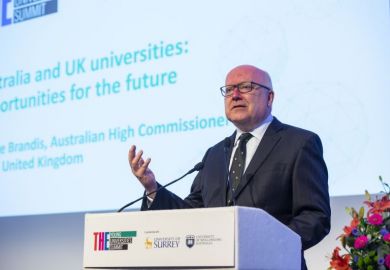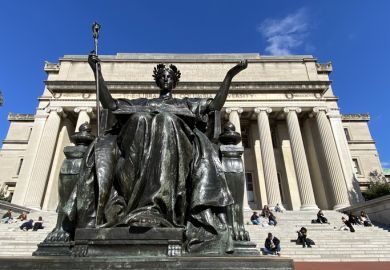The UK has “zero chance” of joining the next European Union research programme in the case of a no-deal Brexit, according to a former senior Brussels official who predicted that the country would respond by rolling back regulations that govern contentious areas of science.
The warning came as the return to government of Jo Johnson – a vocal opponent of Brexit from the back benches – in his former brief as universities and science minister has brought questions about his current stance from his Labour shadow.
Moreover, with the government led by Mr Johnson’s brother Boris now “working on the assumption” of a no-deal departure, Universities UK circulated a briefing on “Immediate consequences of a no-deal Brexit for universities” to ministers on 29 July.
“EU students entering the UK would be subject to the European Temporary Leave to Remain system only allowing them to stay in the UK for up to three years,” says the briefing, meaning medics, PhD students and others on longer courses would have to apply for visas. “Potential students may therefore be put off from choosing UK universities,” it adds.
“UK researchers would become ineligible to compete for the globally prestigious research funding from the European Research Council and Marie Skłodowska-Curie Actions” sections of the EU’s current research programme, UUK warns.
There would be “considerable uncertainty amongst prospective EU students about their future fee/loan status which could lead to reduced interest in studying in the UK”, it adds.
UUK also says: “There is a real risk that a no-deal exit could jeopardise the UK’s ability to associate with the next Horizon and Erasmus+ programmes which run from 2021-27.”
Without access to Horizon Europe, the EU’s next research programme, UK universities could lose the ability to host ERC grant holders – among the world’s best scientists – and lose out on the £1 billion a year they currently receive from the overall scheme.
Robert-Jan Smits, former director general of research and innovation at the European Commission, told Times Higher Education: “In [the event that] Boris Johnson walks out without a Brexit deal, the chances for the UK to become associated to Horizon Europe are not close to zero, they are zero. No one can expect from Brussels that favours are given to someone who has enjoyed a great meal with good wine and then leaves the restaurant without paying his part of the bill.”
However, others argue that the UK may be able to access ERC grants and lead projects as a third country, under potential rules for Horizon Europe – lessening the impact of a failure to associate.
Theresa May, Boris Johnson’s predecessor, had said the UK was “committed to establishing a far-reaching science and innovation pact with the EU, facilitating the exchange of ideas and researchers”, which would include access to EU programmes.
Venki Ramakrishnan, the Nobel prizewinning biologist who is president of the Royal Society, said he had “never even considered Europe or Britain” when he left his home country of India in the early 1970s to pursue postgraduate study in the US.
But since then there has been a “resurgence of European science”, he added. “A lot of that has to do with the ease of movement of people in Europe, the ease of collaboration, the ability to get together to tackle really large-scale problems: the Higgs boson, or space, or large-scale clinical trials.”
He continued: “Europe became a big global power again. Now, if we go without a deal, it will be very, very hard to do a specific deal [with the EU] on science.”
Professor Ramakrishnan noted that nations including Israel had associated to the EU’s current research programme. “But Israel has not left the EU in a spirit of acrimony,” he added.
However, he said some early announcements by the new prime minister had been “very welcome”, such as “the desire to spend on infrastructure, science and technology” and the scrapping of the “completely bogus” net migration target – viewed by universities as hindering the recruitment of overseas academics and students.
In Boris Johnson’s first speech, outside 10 Downing Street, he began a list of the UK economy’s “enormous strengths” with mention of its capacities “in life sciences, in tech, in academia”. He added that the UK “should start now to liberate the UK’s extraordinary bioscience sector from anti-genetic modification rules” and “change the tax rules to provide extra incentives to invest in capital and research”.
Mr Smits, now president of the Eindhoven University of Technology, said: “The strategy of [Boris] Johnson will be to ‘go global’ and build strategic partnerships with partners from across the world. The Commonwealth [nations] are the obvious candidates. At national level, he will invest big-time in research and innovation – notably in fields which are national security and defence-related such as aeronautics, space and satellites – will consider setting up a UK version of the ERC and loosen the regulations on GMOs [genetically modified organisms], CRISPR-Cas and embryonic stem cell research to attract foreign research funds, notably from US companies.”
But Mr Smits added: “Whether this will be enough to compensate for not being associated to Horizon Europe and being excluded from participating in the prestigious ERC, only the future will tell. I have my doubts.”
Gordon Marsden, Labour’s shadow higher education minister, said there was “a massive disconnect, right at the heart of government, between what Boris Johnson has said [on no-deal] since he became prime minister and what Jo Johnson said before Boris became prime minister”.
Mr Marsden added that the government contemplating no-deal was “a very dangerous game for confidence in our HE institutions”.
Mr Marsden also highlighted Jo Johnson’s “very vocal opposition” to the May government’s review of post-18 education, which called for a cut in tuition fees and alarmed universities. “One is assuming that most, if not all, of the provisions in Augar will never see the light of day under this government,” he added.
But Mr Marsden said the call for “urgent action” on part-time and mature student support should be taken forward by Mr Johnson. And he warned that the minister’s past will be “coming back to haunt him” in the shape of the forthcoming independent review of the teaching excellence framework – created by Mr Johnson – and the brewing battle over some for-profit providers’ access to public funding, which he described as a legacy of Mr Johnson’s “marketisation” policies.
POSTSCRIPT:
Print headline: ‘Zero chance’ of EU research funds access in no-deal scenario
Register to continue
Why register?
- Registration is free and only takes a moment
- Once registered, you can read 3 articles a month
- Sign up for our newsletter
Subscribe
Or subscribe for unlimited access to:
- Unlimited access to news, views, insights & reviews
- Digital editions
- Digital access to THE’s university and college rankings analysis
Already registered or a current subscriber? Login








